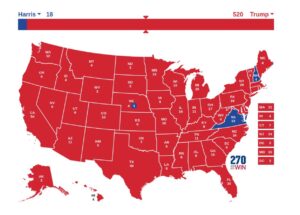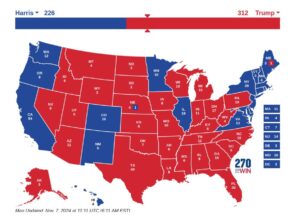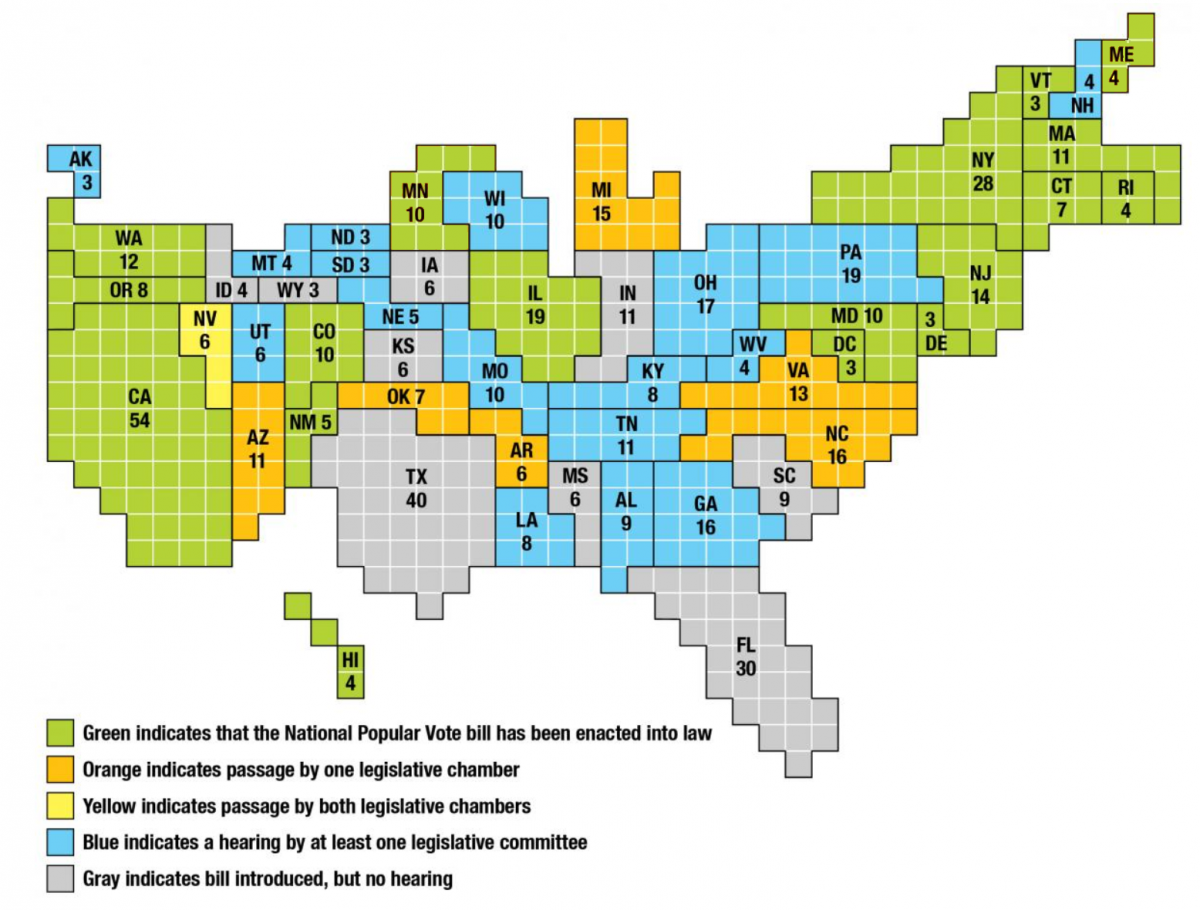
Under The National Popular Vote Compact, Trump Crushed Harris 520 to 18
Internet Privacy Advocate
[Editor’s note: Democrats who complain that the President should be elected on the basis of the popular rather than electoral college vote may want to think again. Here’s what would have happened had their own plan to circumvent The Electoral College been in place for the 2024 election.]
The National Popular Vote Compact is an agreement among a group of seventeen (17) US states and the District of Columbia in which they have agreed by law to give away all of their electoral votes to whichever candidate wins the popular vote.
In the most recent presidential election. Trump was quick to win the 270 electoral college votes he needed. More importantly he also won the popular vote – with 51 percent, over Harris’s 47.5 percent, throwing cold water on any idea that Democrats could repeat their 2016 complaints that he was the less popular choice across the country.
Here is a map that shows President Trump’s popularity over Harris when the National Popular Vote Compact distorts the true outcome of the Electoral College count with Trump crushing Harris 520 to 18:

This is the blow out of all blow outs and demonstrates the lunacy of actually implementing the National Popular Vote Compact.
According to https://www.nationalpopularvote.com/state-status, as of April 15, 2024, the National Popular Vote bill has been enacted into law in 18 jurisdictions possessing 209 electoral votes, including
- 6 small jurisdictions (District of Columbia, Delaware, Hawaii, Maine, Rhode Island, Vermont),
- 9 medium-sized states (Colorado, Connecticut, Maryland, Massachusetts, Minnesota, New Jersey, New Mexico, Oregon, Washington), and
- 3 big states (California, Illinois, New York).
Unfortunately, according to nationalpopularvote.com, the National Popular Vote bill will only take effect when enacted into law by states possessing 270 electoral votes (a majority of the 538 electoral vote potential). According to the website, the bill will take effect when enacted by states possessing the additional 61 electoral votes needed to reach 270.
Status of National Popular Vote Bill in Each State
Alaska Alabama Arkansas Arizona California Colorado Connecticut DC Delaware Florida Georgia Hawaii Iowa Idaho Illinois Indiana Kansas Kentucky Louisiana Massachusetts Maryland Maine Michigan Minnesota Missouri Mississippi Montana North Carolina North Dakota Nebraska New Hampshire New Jersey New Mexico Nevada New York Ohio Oklahoma Oregon Pennsylvania Rhode Island South Carolina South Dakota Tennessee Texas Utah Virginia Vermont Washington Wisconsin West Virginia Wyoming
As of April 15, 2024, the National Popular Vote bill has been enacted into law in 18 jurisdictions possessing 209 electoral votes, including
- 6 small jurisdictions (District of Columbia, Delaware, Hawaii, Maine, Rhode Island, Vermont),
- 9 medium-sized states (Colorado, Connecticut, Maryland, Massachusetts, Minnesota, New Jersey, New Mexico, Oregon, Washington), and
- 3 big states (California, Illinois, New York).
The National Popular Vote bill will take effect when enacted into law by states possessing 270 electoral votes (a majority of the 538 electoral votes). The bill will take effect when enacted by states possessing an additional 61 electoral votes.
The National Popular Vote bill has also passed at least one legislative chamber in 7 states possessing 74 electoral votes (Arkansas, Arizona, Michigan, North Carolina, Nevada, Oklahoma, Virginia). The bill has passed both houses of the Nevada legislature at various times. The National Popular Vote bill has been introduced all 50 states at various times. Overall, the National Popular Vote bill has now passed a total of 43 state legislative chambers in 24 states.
On the map below, each square represents one electoral vote (out of 538).
Map design (various versions) courtesy of Craig Barratt, Victor-Bobier, Jeff Pfoser, and Chris Pearson
The states are listed below alphabetically. Click here for chronological history.
Arkansas – Passed House in 2007 and 2009
Arizona – Passed House in 2016
California – Enacted into law
Colorado – Enacted into law in 2019 by legislature and Governor, and approved by Colorado voters on November 3, 2020
Connecticut – Enacted into law
District of Columbia – Enacted into law
Delaware – Enacted into law
Georgia – Unanimously approved by House committee in 2016
Hawaii – Enacted into law
Illinois – Enacted into law
Massachusetts – Enacted into law
Maryland – Enacted into law
Maine – Enacted into law
Michigan – Passed House in 2008
Minnesota – Enacted into law
Missouri – Unanimously approved by House committee in 2016
North Carolina – Passed Senate in 2007
New Jersey – Enacted into law
New Mexico – Enacted into law
Nevada – Passed Assembly in 2009; passed the Assembly and Senate in 2019, but vetoed; Passed Assembly and Senate in 2023 as a constitutional amendment
New York – Enacted into law
Oklahoma – Passed Senate in 2015
Oregon – Enacted into law
Rhode Island – Enacted into law
Virginia – Passed House in February 2020
Vermont – Enacted into law
Washington – Enacted into law
The National Popular Vote bill has passed at least one legislative chamber in 7 states possessing 74 electoral votes (Arkansas, Arizona, Michigan, North Carolina, Nevada, Oklahoma, Virginia). The bill has passed both houses of the Nevada legislature at various times. The National Popular Vote bill has been introduced all 50 states at various times. Overall, the National Popular Vote bill has now passed a total of 43 state legislative chambers in 24 states.
Below is an Electoral College map as the system was established by the founders of the Constitution and implemented correctly today:

[Editor’s note: The Founding Fathers created The Electoral College lest the smaller states be neglected by the national parties, since they would typically win national elections without them. Democrats, who care only about power and control, could care less. But Trump won both!]

No comments:
Post a Comment